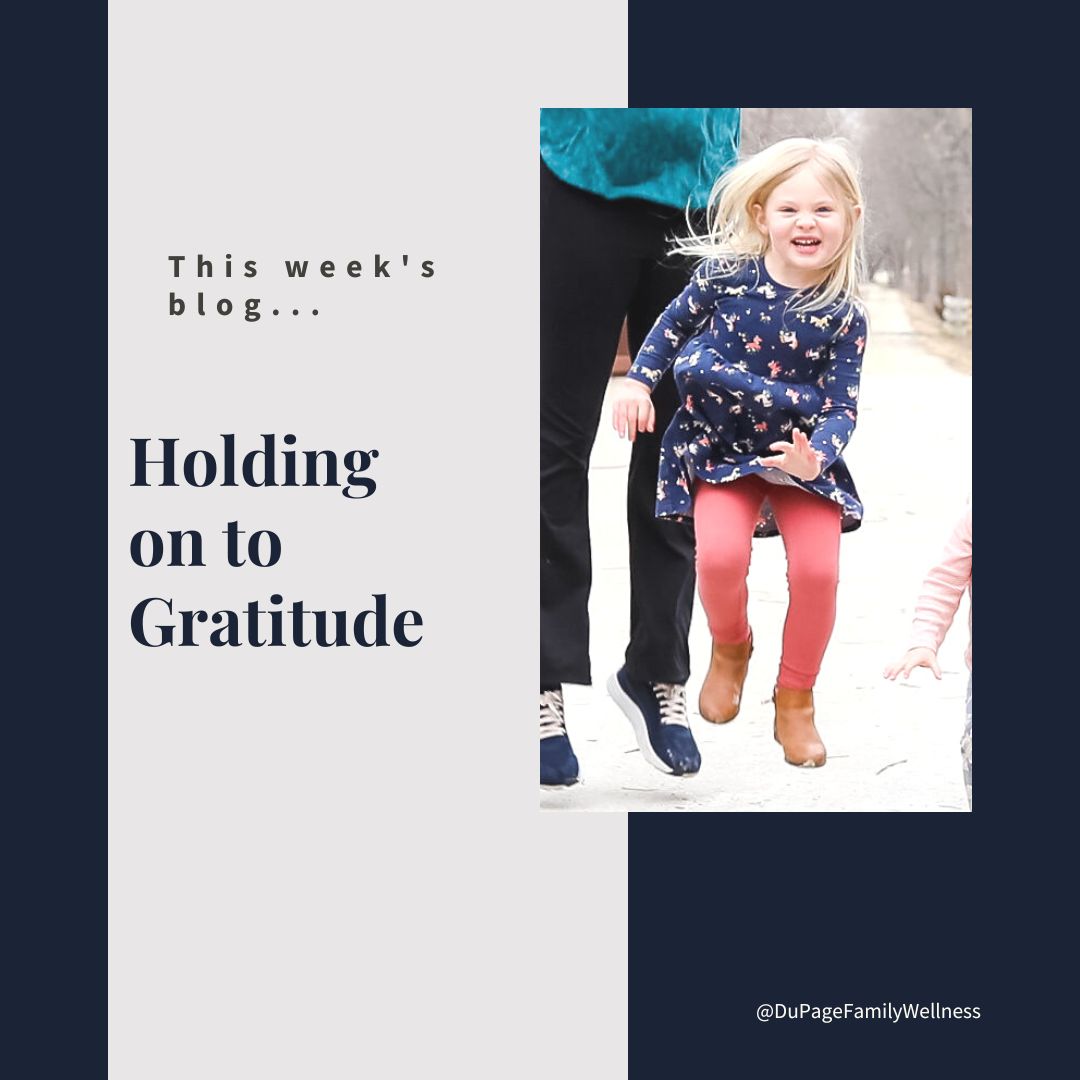 This year the list of things my girls are thankful for includes mom, dad, sisters, friends, string cheese, cookies, candy, rainbows, and unicorns!
This year the list of things my girls are thankful for includes mom, dad, sisters, friends, string cheese, cookies, candy, rainbows, and unicorns!
Focusing on gratitude this season is lovely, but expressing genuine gratitude can be a healing practice all year round. So, let’s use this holiday to set the tone for the rest of the year by creating a gratitude practice.
A gratitude practice is different from having an "attitude of gratitude" or "looking on the bright side of things." It is more intentional than just being optimistic or thankful from time to time and requires a decision to set aside time for gratitude each day.
It’s a simple thing that will benefit your physical, psychological, and social well-being. Since it's free, does not take much time, and can be done in the privacy of your own home anyone can do it.
Let's explore some of these benefits and consider how to incorporate a gratitude practice into our lives.
The Benefits of Gratitude
Feeling gratitude is good for our brains activating the hypothalamus and flooding our brains with the feel-good hormone dopamine. Some studies have found it decreased the prominent stress hormone cortisol and blood pressure while increasing heart rate variability.
Robert Emmons, the world’s leading scientific expert on gratitude, found that people who consistently practice gratitude report many physical, psychological, and social benefits such as:
Physical
- Stronger immune systems
- Less bothered by aches and pains
- Lower blood pressure
- Exercise more
- Take better care of their health
- Sleep longer
- Feel more refreshed upon waking
Psychological
- Higher levels of positive emotions
- More alert, alive, and awake
- More joy and pleasure
- More optimism and happiness
Social
- More helpful, generous, and compassionate
- More forgiving
- More outgoing
- Feel less lonely and isolated
How to Cultivate a Gratitude Practice
A gratitude practice is simply forming habits that help you focus on something you are thankful for on a regular basis. It could be an object, person, or experience. You may be thankful for your health or a quality you see in yourself. Anything is fair game!
You must be genuine to get the benefits of this practice, so be completely honest with yourselves. More benefit will come from focusing on small things you are truly thankful for than from pretending you are grateful for larger things that you think you should be thankful for.
It’s important to keep your gratitude practice fresh. If you start to feel like you are doing your gratitude practice to check it off your to-do list, it may be time to try something new. With so many ways to explore gratitude, there is no reason to get stuck in a rut.
- Create a gratitude journal.
- Write thank you cards or letters of affirmation to people in your life.
- Think about qualities you are thankful for in yourself.
- Meditate on things you are grateful for each morning for 5 minutes.
- Help someone who doesn’t have all the advantages that you do.
- Find something to look forward to each week.
- Think about someone who has influenced your life and write them a letter.
- Pray to express thankfulness for the good things in your life.
- Write down one word that brings up feelings of gratitude and think about it throughout the day (hope, life, family, friends, health, etc.).
- Listen to a song you enjoy and take time to really appreciate it.
- Practice mindful eating to appreciate the gift of food.
- Check out 40 Simple Ways To Practice Gratitude for more ideas.
Read more ...
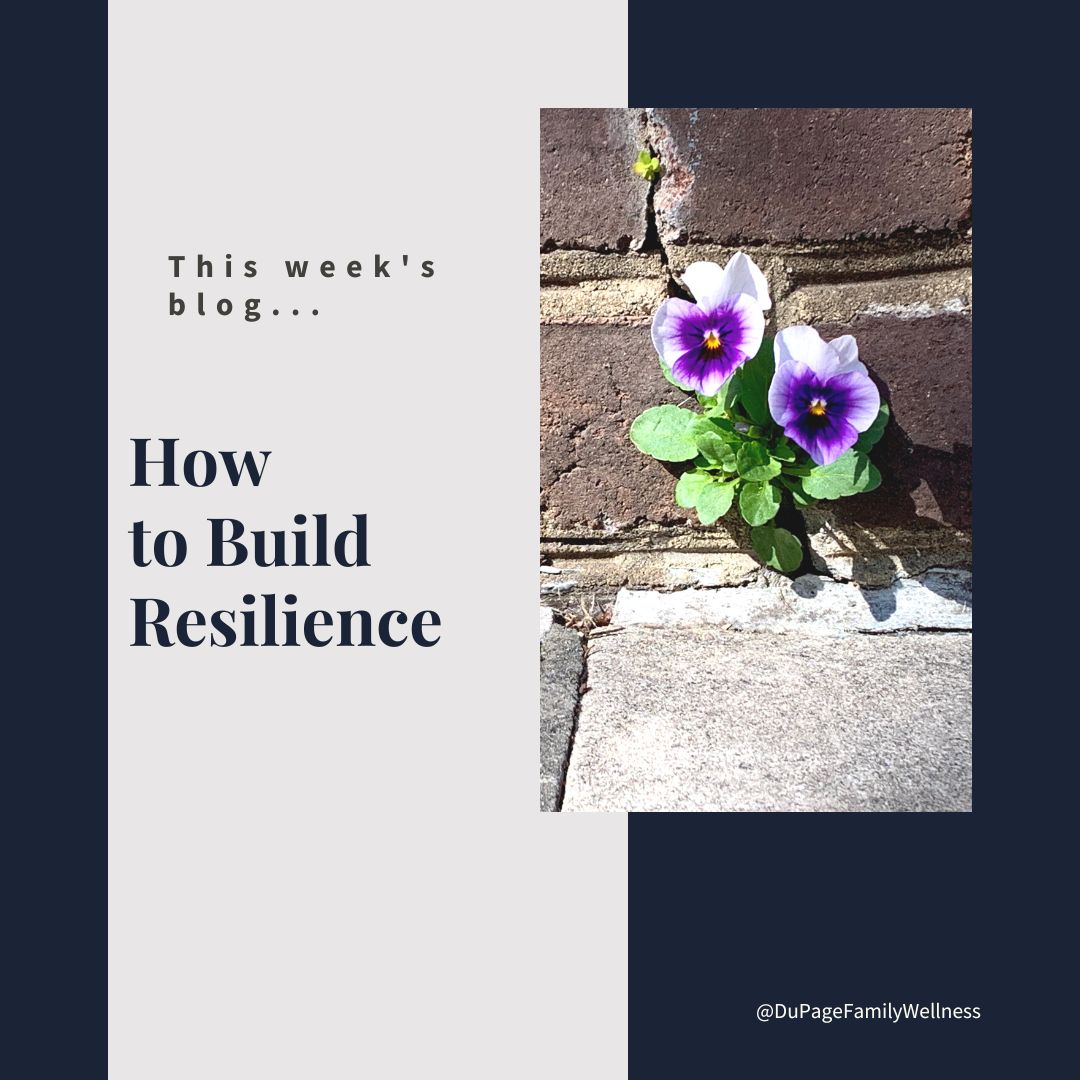 Resilience is the capacity to recover quickly from difficulties. It is what allows you to bounce back from challenges. There is no way to prevent all hardship, but we can build resilience so when trouble comes we can recover in the best way possible.
Resilience is the capacity to recover quickly from difficulties. It is what allows you to bounce back from challenges. There is no way to prevent all hardship, but we can build resilience so when trouble comes we can recover in the best way possible.
We see this principle in nature all the time. In the animal kingdom, diversity keeps the different populations in check and protects our ecosystems. Rotating crops protects the soil from becoming depleted.
In order to build resilience, we need to establish diversity in our lives. It makes us more resilient physically and mentally. This helps our bodies heal more fully and makes us more capable of moving through trials in a healthy way.
Let’s explore some areas in our lives that would benefit from diversity.
Diversity in our Diets
We need to eat a variety of foods to ensure we get the right combination of vitamins, minerals, and phytonutrients. Even if you are eating healthy food you need diversity; it’s not enough to eat chicken and broccoli all day.
A diet consisting of an assortment of healthy food supports the different types of gut bacteria. It is necessary for each microbial species to be taken care of in order to have a balanced microbiome. Imbalances in the gut can lead to health problems throughout the body.
Step outside of your comfort zone and try to…
- eat the rainbow - have fruits and vegetables of every color throughout the week.
- eat a variety of protein - chicken, beef, eggs, fish, and shellfish.
- eat different parts of the animal - organ meat is the most nutritious part of the animal; liver is like nature's multivitamin.
- drink bone broth - it has a different amino profile than muscle meat and is incredibly nourishing to your gut lining, skin, hair, nails, and joints!
Diversity in our Movement
It is best to use a variety of full-body movements. Repetitive movements will make you prone to injury while limiting the mobility and strength that you would likely gain through more diversified movements.
Katy Bowman, the author of Move Your DNA, believes we need a variety of movements. She equates diversity in movement to getting movement "nutrients."
Step outside of your comfort zone and try to…
- go barefoot outside on irregular surfaces - those tiny foot bones will get some movement instead of being trapped in a shoe on flat grounds.
- get out in nature- hike off the beaten path or climb a hill.
- ditch the couch - sitting on the floor will engage your core.
- play like a child - incorporate movements you did as a child (running, chasing, climbing, or swinging).
- participate in sports - most sports will give you much more variety of movement than simply going for a run, a walk, or working out on an Elliptical.
- mix up exercise routines - some days lift heavy things focusing on body weight movements. Do mobility work on other days. Remember to use your whole body.
Listen to your body, and take breaks when necessary. Remember, movement doesn't just count when you are exercising. All your movement counts.
Diversity Emotionally
It is normal and natural to feel all different kinds of emotions. It shows that you are in touch with your inner world. People who aren’t able to feel a full spectrum of emotions are often stuffing their difficult ones. This can lead to depression, anxiety, resentment, as well as a host of physical problems.
Allowing a variety of emotions to be experienced can help you move through the difficult ones more effectively. This creates emotional resilience that you can’t get if you only allow yourself to feel “good” emotions.
Step outside of your comfort zone and try to…
Read more ...
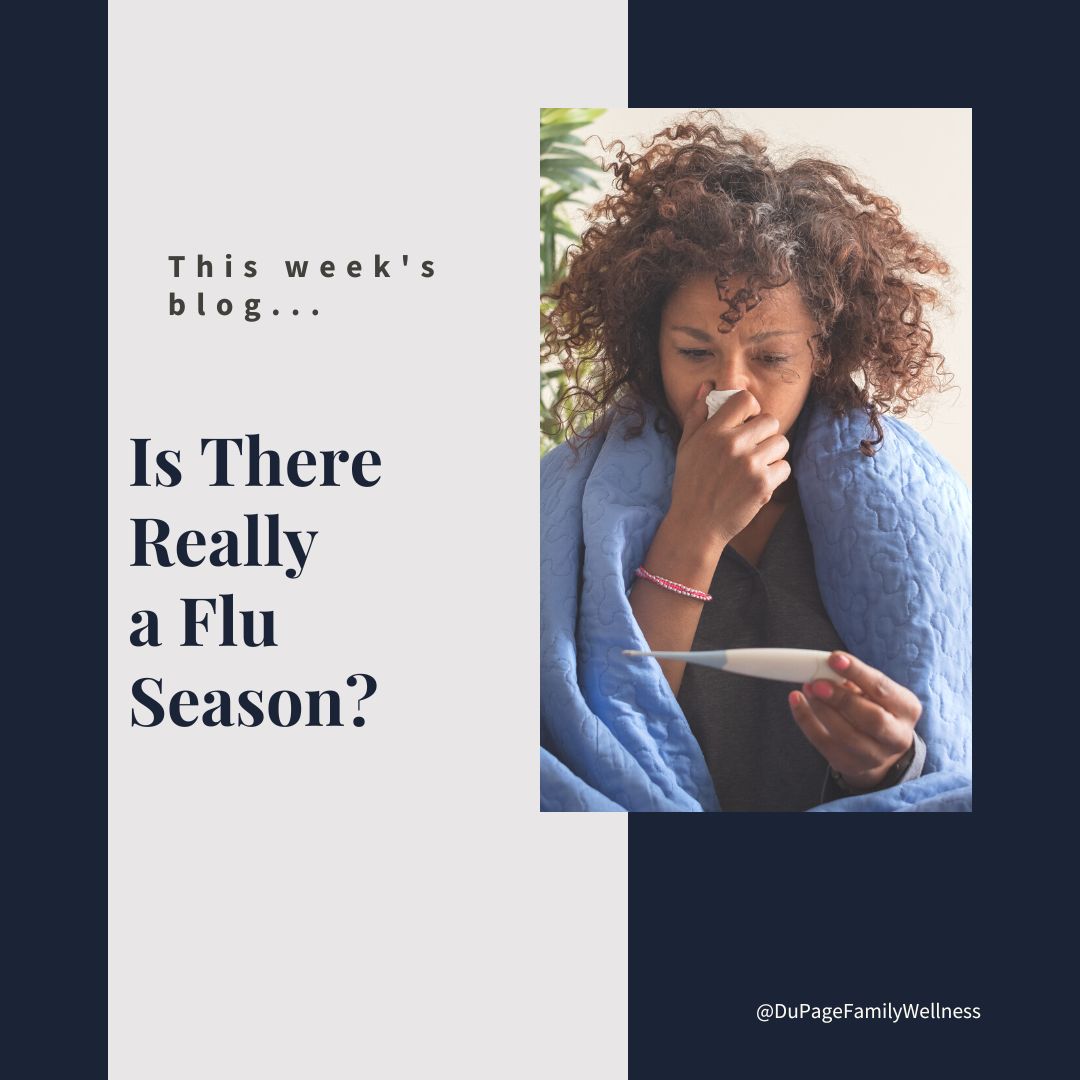 Many people believe that it is the beginning of the dreaded flu season! It is true that there are more cases of the flu diagnosed this time of year, but germs for the flu are around all year.
Many people believe that it is the beginning of the dreaded flu season! It is true that there are more cases of the flu diagnosed this time of year, but germs for the flu are around all year.
So, if these germs are always around, why do we see an increase in the number of flu cases during the fall and winter months? Could it be that the sugar and stress of the holidays impact our immune systems and leave us vulnerable to these illnesses?
Perhaps we should start calling it the “sugar and stress season!” As enjoyable as they are, the holidays lend themselves to both sugar and stress. Think about the Halloween candy, Thanksgiving pumpkin pie, and the sugar cookies on Christmas. Then add the stress of preparing for the holidays. No wonder our bodies are worn down.
Let’s take a look at this theory and explore ways to combat it this year.
The Condition of Your Soil
Dr. Angie Elliot uses a great analogy in her article, “There’s No Such Thing As ‘Flu Season’.” She talks about putting a seed in the ground without covering it in soil or giving it water, sun, and air. Would it survive? No way!
Elliot explains that “the soil (is) not ideal for the seed to take root and for the plant to flourish.” She encourages you to “consider your body equivalent to soil and a virus or bacteria as the seed. If you planted that seed in your body right now, could it grow?"
Many people get sick with colds or the flu this time of year because the condition of their body is primed for pathogens to thrive and grow.” When you look at it this way, it is easy to see things that impact your body's immune system and create an environment where germs can thrive.
What Impacts Your “Soil”
Some things that cause us stress in our bodies are obvious, while other things are more subtle. Often we are so used to these things that we don’t even realize that they are causing trouble.
This is the one day a year we are literally surrounded by candy. It is really hard to limit ourselves when we are handing it out all night and watching our children sort through their treasure. We will look at some tips for handling this in next week’s blog.
It's hard enough to get adequate sleep without the added responsibilities that come with making the holidays special. Planning events and buying gifts are enough to make us hate Pintrest and resent Martha Steward. Keep posted for some tips on buying gifts and planning menus as we get closer to the holidays.
Life can get overwhelming if we accept every invitation. Take time to consider your values. Use them as a guide to determine how to spend your time. Do you really want to go to three cookie exchanges? Can you go from one Thanksgiving dinner to the next without getting worn out? Now, more than ever, you will need boundaries.
Chicago gets pretty overcast this time of year, and the amount of time we spend outside may decrease quite a bit. These factors can affect our mood and vitamin D levels. Feel free to reach out if you’d like to discuss supplementation.
Holidays tend to be filled with sugary treats. You can often find them at the office and the holiday events you attend. It is hard to be social without the constant presence of sweets. Use some of the tricks we will talk about in our Halloween blog to handle other holidays.
In the busyness of the season, our workouts can be forgotten. Since we aren’t outdoors as much, we tend to be less active. And if you suffer from seasonal affective disorder, it can be really hard to be active.
Read more ...
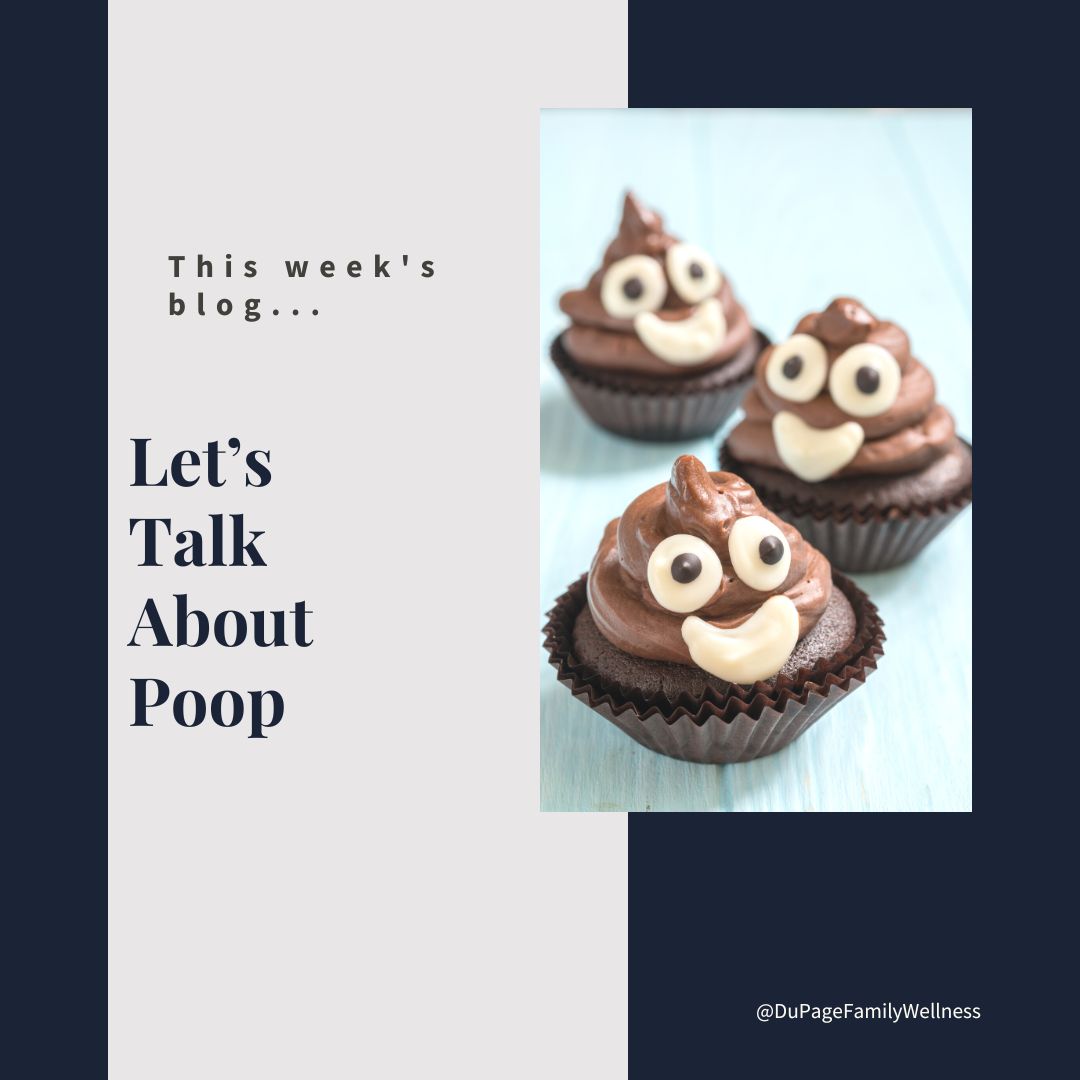 We don’t often talk about poop, so you may not know what is normal. If not, you might be missing important signs that your body is telling you about your digestion. Once you know the ideal, you can start to listen to your body.
We don’t often talk about poop, so you may not know what is normal. If not, you might be missing important signs that your body is telling you about your digestion. Once you know the ideal, you can start to listen to your body.
As we will discuss, the frequency and consistency of your poop are great indicators of your digestive health. It's important to understand these messages because your digestive and gut health has a tremendous impact on your overall health.
Obvious symptoms of digestive trouble include stomach upset, gas, constipation, or diarrhea. However, even without those signs, you may be suffering from poor digestion and gut trouble without even knowing it.
Let’s shake the awkwardness of the conversation so that we can listen to the messages our body is sending us.
The Basics
When we talk about poop, we will be looking at the form, frequency, color, and smell. Each of these aspects can give us insight into our digestive health.
When we consider the form of our poop, the Bristol Stool Chart is a helpful tool. This chart was developed by Stephen Lewis and Ken Heaton at the Bristol Royal Infirmary. It is a diagnostic tool that classifies human feces into seven forms.
Take a moment to look at the chart and consider what you tend to experience!

Cabot Health, Bristol Stool Chart / CC BY-SA (https://creativecommons.org/licenses/by-sa/3.0)
An Ideal Poop
Ideally, we will have smooth soft poop that doesn’t fall apart when the toilet is flushed (a four on the Bristol Chart). The poop should be a chocolatey brown color like that of a Hershey bar. Bowel movements should not have a very strong odor or be difficult to wipe.
Since bowel movements are one of the body’s ways of eliminating toxins, it is important to have one to three bowel movements consistently each day. It should not hurt to poop, and you shouldn’t have to strain.
Trouble Signs
There are many things to look for if you are not experiencing an ideal poop. Once you identify the issue, you can start working on a solution.
- Form - Having poop that is too soft could mean that you are not eating enough fiber, while poop that is too hard may indicate that you need to drink more water.
- Color - Poop that is very dark could indicate bleeding in the GI tract, while poop that is too light may indicate malabsorption.
- Frequency - Less than one bowel movement a day is a sign of constipation, while more than three bowel movements a day is considered diarrhea. These are important indicators of gut health and should be discussed with your doctor.
- Smell - Poop doesn’t smell lovely, but it shouldn’t smell terrible either and could be a sign of a heavy toxin burden.
It may be important to work with your doctor if you are experiencing any of these trouble signs to identify the root cause. There are many other things that it could indicate as well (bacteria, parasites, thyroid trouble, etc.).
A Modern Solution
Many people say that squatting is the most natural way to poop, putting the body in the right position to strain less while eliminating waste more thoroughly. Squatting relaxes the muscles providing a straighter pathway that allows things to flow better.
The Squatty Potty is a modern toilet stool that allows you to get in a squat position while sitting on the toilet. It was created by a family who was trying to help a loved one dealing with constipation.
In addition to having a great product design, they are known for their hysterical (but educational) commercials…

(The Squatty Potty’s educational, funny, and slightly inappropriate commercial!)
It’s not every day that we talk openly about poop or mystic unicorns! But since our digestion greatly impacts our overall health, maybe we should start talking about it more. Please know that I am comfortable talking about all these awkward health topics. Feel free to bring them up with me; anything that concerns your health is fair game!
Dr. Jamie
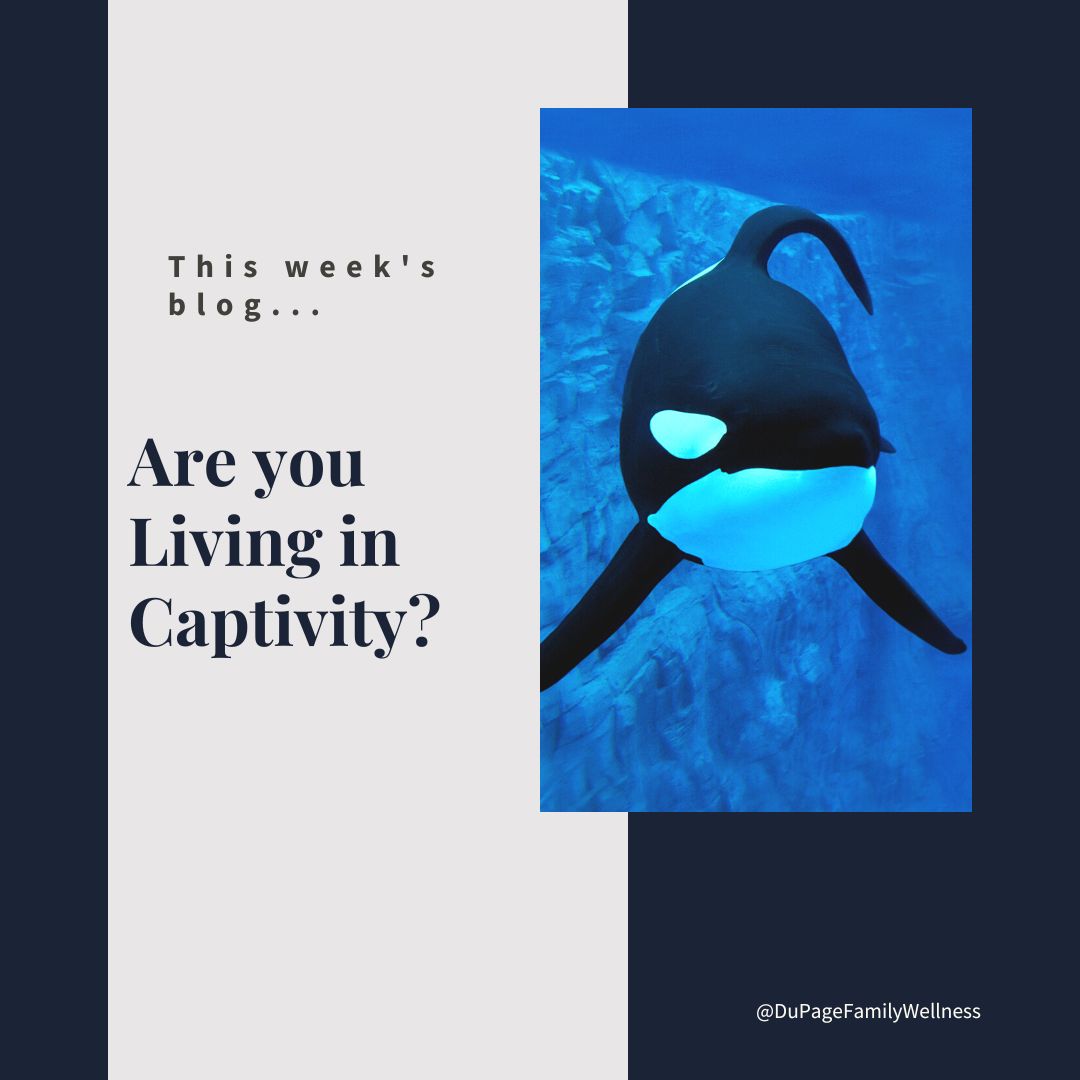 In a large nationwide study, U.S. adults were found to be more sedentary than previously observed. A sedentary lifestyle is defined as being somewhat inactive and characterized by much sitting.
In a large nationwide study, U.S. adults were found to be more sedentary than previously observed. A sedentary lifestyle is defined as being somewhat inactive and characterized by much sitting.
In this study, self-reports showed a mean of over nine hours of inactive behavior on a given day. When you add that to the time you sleep at night, that's a staggering number.
Overall, the “largest single source of sedentary time of the population was potentially modifiable leisure-time sitting, and more than 80% of this time was attributed to the consumption of electronic media.”
Let’s explore your habits and look at the benefits of movement.
Look at Your Day
Take a minute to list what you do on a typical day. Start when you wake up, get ready in the morning, go to work, and come home. Is there movement built into your day, or do you have to make an effort to include it?
As a culture, we have forgotten the value of moving throughout the day. We tend to think we live an active lifestyle if we go to the gym regularly. Going to the gym is great; however, if we are sitting the rest of the day we are still living a sedentary life which will be detrimental to our health.
According to Dr. James Levine, the director of the Mayo Clinic-Arizona State University Obesity Solutions Initiative, “Sitting is more dangerous than smoking, kills more people than HIV, and is more treacherous than parachuting. We are sitting ourselves to death.”
Are You Living in Captivity Too?
In the wild, it is natural for orca whales to swim up to 100 miles a day while foraging for food. In captivity, this natural unrestricted movement is not possible. Instead of swimming through the ocean in an unrestricted manner, the captive orca spends its days swimming in circles. This lack of natural movement may result in the orca’s fin collapsing.
As humans, when we restrict our movement due to work, busyness, or other lifestyle choices, we are like the captive orca swimming in circles. It’s like we have put ourselves into “captivity” without even realizing it!
Ways We Put Ourselves in Captivity
Our culture, in an attempt to make life smoother, sets us up for a lack of natural movement.
- Modern society has us sitting in straight-backed chairs for hours and then resting on the couch in the evening. Passive lounging does not use the muscles our ancestors used when they sat on the ground.
- Sidewalks allow us to walk on flat ground, often in shoes that bind our feet restricting our movement. It changes our gait and prevents the muscles from developing naturally. High heels are even worse, putting us in positions we were never intended to be.
- Even when we exercise, we often use machines that force our bodies into precise, yet unnatural movements. Our bodies were not designed to do these movements over and over. There is much more benefit to moving the body as a whole.
Read more ...
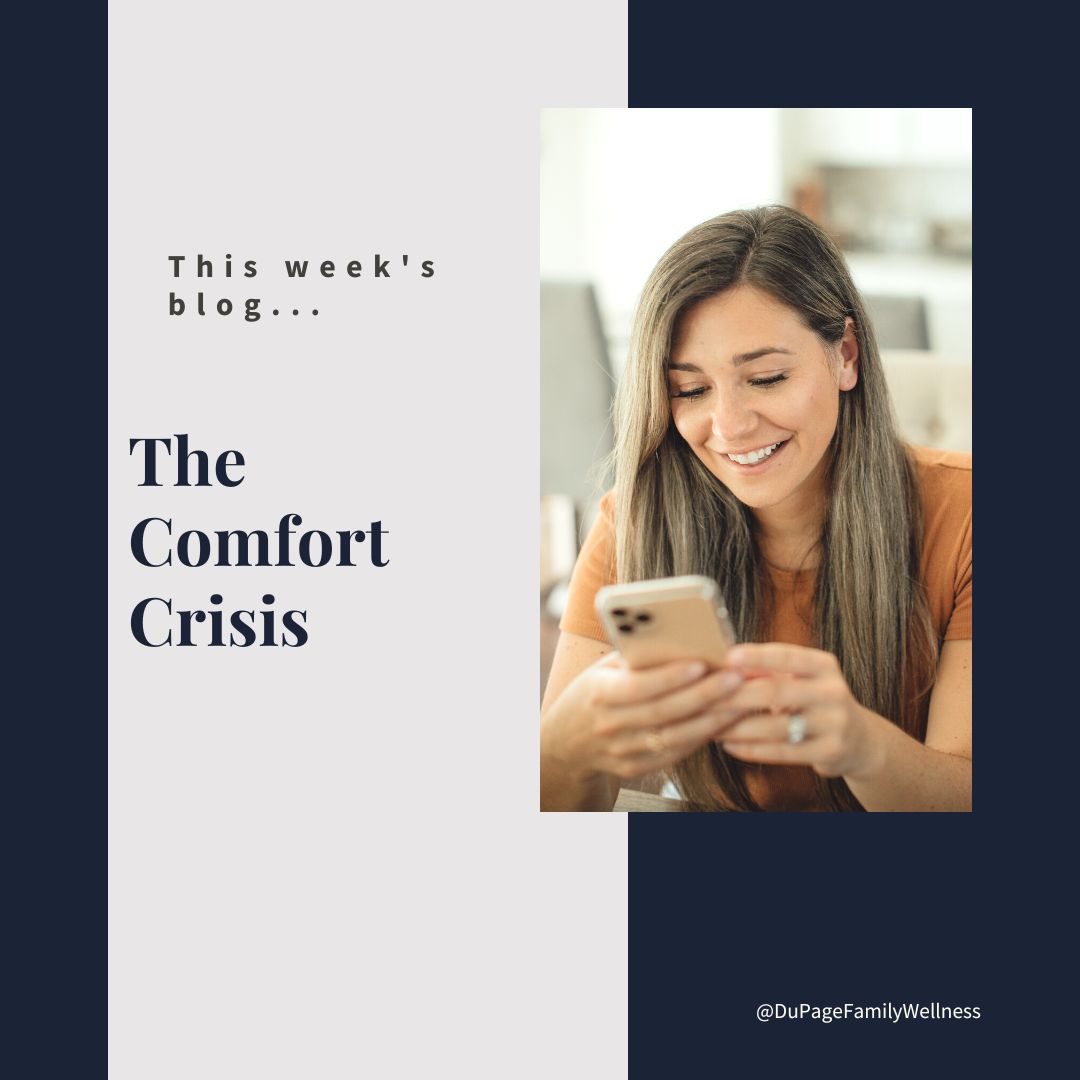 Recently I listened to "The Comfort Crisis" By Michael Easter.
Recently I listened to "The Comfort Crisis" By Michael Easter.
In many ways, we are more comfortable than ever before, but could our privileged lives be doing us harm? This book explains how our culture sets us up for physical and emotional suffering by making life too easy.
Easter grew up in a family plagued with addictions. As a young man, he used drugs to avoid uncomfortable emotions and found himself addicted too. When he walked a path towards sobriety, he began to experience much discomfort. Knowing it was part of the process of getting free he learned to embrace it.
Once he was sober, he began recognizing the incredible benefits of discomfort. He realized that our culture prioritizes comfort so much that it’s impacting our very experience of being human. In Easter’s view, comfort has lulled us into a complacency that takes meaning and joy out of life.
His quest to break out of this took him to the Arctic. There for thirty days, he had little of the comforts we take for granted each day. In return, he experienced physical strength, emotional health, a clear mind, and extreme gratitude.
He already shares many of my views about living more like our ancestors, but there was one lesson in this book that really stood out to me. Since I've spent many articles talking to you about all of the wonderful ways to live like our ancestors, I'll highlight my major takeaway today.
Is Life Just Passing You By?
I have heard over and over again from people that as you age, time just seems like it goes by faster and faster. As a child, time seems relatively slow in comparison, and then seems to speed up over the years. Easter dove into this idea in the book and explained that most of us simply live our lives on autopilot. We wake up, drink coffee, go to work, come home, watch TV, go to bed, and repeat (or some variation of that). We do similar things for exercise, eat and cook familiar meals, have our favorite activities for entertainment, or simply spend time distracted by our devices.
When we are young, everything is new and exciting. We are constantly learning. Then, as we grow up, we get comfortable. For many of us, our day-to-day lives don't offer much in the way of novelty, learning new skills, or getting out of our comfort zone. In the book, Easter dives into all of the details about how doing the above-mentioned activities can help you reclaim a wilder, happier, and healthier self.
Benefits of Embracing Discomfort
Easter is not opposed to comfort, believing it is only a problem when we always seek comfort. Below are some of the specific benefits he has experienced from embracing discomfort. Many of them are based on avoiding the comfort that modern distractions bring.
- Hard things make other day-to-day things seem easy in comparison.
- Deep thoughts emerge when you avoid modern distractions.
- Creativity and productivity increase after periods of boredom.
- Accepting and listening to your feelings gives you valuable information.
- Gratitude increases after periods of deprivation.
- Recognizing that you can do hard things reveals where you are selling yourself short.
- Gaining a sense of meaning and purpose.
Read more ...
 This year the list of things my girls are thankful for includes mom, dad, sisters, friends, string cheese, cookies, candy, rainbows, and unicorns!
This year the list of things my girls are thankful for includes mom, dad, sisters, friends, string cheese, cookies, candy, rainbows, and unicorns!

 Resilience is the capacity to recover quickly from difficulties. It is what allows you to bounce back from challenges. There is no way to prevent all hardship, but we can build resilience so when trouble comes we can recover in the best way possible.
Resilience is the capacity to recover quickly from difficulties. It is what allows you to bounce back from challenges. There is no way to prevent all hardship, but we can build resilience so when trouble comes we can recover in the best way possible.  Many people believe that it is the beginning of the dreaded flu season! It is true that there are more cases of the flu diagnosed this time of year, but germs for the flu are around all year.
Many people believe that it is the beginning of the dreaded flu season! It is true that there are more cases of the flu diagnosed this time of year, but germs for the flu are around all year.  We don’t often talk about poop, so you may not know what is normal. If not, you might be missing important signs that your body is telling you about your digestion. Once you know the ideal, you can start to listen to your body.
We don’t often talk about poop, so you may not know what is normal. If not, you might be missing important signs that your body is telling you about your digestion. Once you know the ideal, you can start to listen to your body.  In a large nationwide study, U.S. adults were found to be more sedentary than previously observed. A sedentary lifestyle is defined as being somewhat inactive and characterized by much sitting.
In a large nationwide study, U.S. adults were found to be more sedentary than previously observed. A sedentary lifestyle is defined as being somewhat inactive and characterized by much sitting.  Recently I listened to "The Comfort Crisis" By Michael Easter.
Recently I listened to "The Comfort Crisis" By Michael Easter.